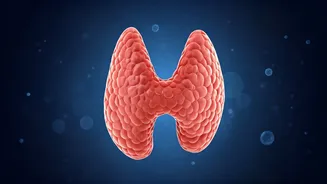Weight Optimization
Maintaining a healthy weight is a fundamental step in minimizing the risk of thyroid cancer. Research suggests that obesity is a contributing factor, so
keeping your body mass index (BMI) within a healthy range is crucial. This involves a balanced diet, rich in nutrients, and regular physical activity to help manage weight effectively. Regular exercise not only helps in weight management but also boosts overall well-being and strengthens your immune system, making your body more resilient against potential health threats. Consider incorporating both cardiovascular exercises and strength training into your routine. This will help you achieve and maintain a healthy weight and further mitigate the risk of developing thyroid cancer.
Cautious Radiation Use
Limiting exposure to radiation, especially during medical procedures, is another critical aspect of thyroid cancer prevention. While radiation therapy is sometimes necessary for treating other cancers, it also carries the risk of damaging thyroid cells. If you need medical imaging or other procedures using radiation, inquire about the potential risks and whether there are alternative approaches. Always discuss the necessity of the procedure with your doctor and ask about the lowest possible dose of radiation needed. Protecting your thyroid during such procedures, if possible, with a lead shield can be a good preventive measure. Being mindful of radiation exposure helps in safeguarding your thyroid health over the long term.
Plant-Rich Diet
Adopting a diet that emphasizes plant-based foods can offer substantial benefits in preventing thyroid cancer. A diet rich in fruits, vegetables, and whole grains provides essential vitamins, minerals, and antioxidants that boost overall health. These nutrients are known for their ability to combat cell damage and reduce inflammation, which are key factors in cancer development. Specifically, consuming foods rich in iodine, such as seaweed and iodized salt, may support thyroid function. Include a variety of colorful fruits and vegetables in your diet daily, aiming for a rainbow of colors to ensure you receive a wide range of nutrients. Making dietary changes is an investment in your health that can contribute to a lower risk of thyroid cancer.
Avoidance of Tobacco
Avoiding tobacco products is a significant step towards reducing the risk of developing thyroid cancer. Smoking and the use of other tobacco products have been linked to an increased risk of several cancers, including thyroid cancer. The harmful chemicals in tobacco damage cells throughout the body and increase the likelihood of cancerous mutations. Quitting smoking and avoiding all forms of tobacco use can lower your risk substantially. Seek support from healthcare professionals or consider smoking cessation programs to help you quit effectively. By making this change, you are significantly improving your overall health and well-being, while simultaneously reducing the risk of thyroid cancer.
Early Sign Awareness
Being aware of the early signs and symptoms of thyroid cancer is vital for prompt detection and treatment. Watch for symptoms like a lump or swelling in the neck, which is often the most noticeable sign. Other symptoms may include hoarseness, difficulty swallowing, or changes in your voice. If you experience any of these symptoms, it is essential to consult with your healthcare provider immediately. Early detection increases the chances of successful treatment. Regular self-examination of the neck can help you identify any changes early on. Being proactive about your health and seeking medical attention for any concerns is a crucial part of prevention.
Stress and Cancer
Managing stress plays a significant role in overall health, including potentially reducing the risk of thyroid cancer. Chronic stress can weaken the immune system, making the body more susceptible to diseases, including cancer. Implementing effective stress management techniques can help you maintain a healthier lifestyle. Practices such as yoga, meditation, deep breathing exercises, and mindfulness can help reduce stress levels. Regular exercise and getting enough sleep are also very important in managing stress. When the body is under less stress, it is more able to fight off potential health threats, decreasing the probability of various health conditions, including thyroid cancer.
Risk-Adapted Screening
Considering risk-adapted surveillance and screening methods is an essential step, especially for those in high-risk groups. Individuals with a family history of thyroid cancer, those with certain genetic predispositions, or those who have been exposed to radiation are at higher risk. Regular check-ups and screenings recommended by healthcare providers can help detect any abnormalities early on. Your doctor might recommend ultrasound exams or other specific tests, depending on your risk factors. These screenings provide a proactive approach, allowing for timely intervention if any issues are discovered. Consult with your doctor to determine the appropriate screening schedule and tests suited for you, based on your individual risk profile. Early detection can lead to more effective treatments and better outcomes.















